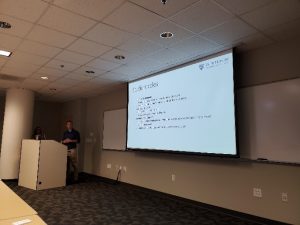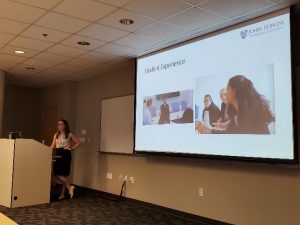Have you ever been working in lab and wondered if your discoveries are innovative and patentable? How do you convert laboratory discoveries into commercialized intellectual property? How do you develop startups into sustainable ventures and establish strategic collaborations?
Johns Hopkins Technology Ventures (JHTV) is the division at The Johns Hopkins University that facilitates intellectual property protection and commercialization of work conducted by Johns Hopkins researchers. Three business units within JHTV support the institution’s mission of translating and commercializing discoveries into accessible technologies, products and services that positively impact society and grow Baltimore’s economy:
- Technology Transfer: The technology transfer team determines which inventions to protect, manages patent portfolios, licenses technologies for development and processes material transfer agreements (MTAs) and nondisclosure agreements (NDAs). An MTA is an understanding in which a party agrees to transfer materials (i.e., biochemical material, including nucleic acids, plasmids, peptides, proteins, viruses, cells, tissue samples, etc.) to another party, under defined conditions. An NDA is a legal contract between at least two parties that outlines confidential material, knowledge or information that the parties wish to share with one another for certain purposes, but wish to restrict access to by third parties.
- Business Development and Corporate Partnerships: The business development team enables long-term agreements with industry collaborators to help translate the research work at Johns Hopkins into real-world applications. These partnerships are crucial for the commercialization of Johns Hopkins technologies in various areas, including oncology, ophthalmology, diagnostics and digital health.
- FastForward: FastForward is the university’s home for startup activity, as it provides the resources and working area for Johns Hopkins’ faculty and student entrepreneurs. Some of these resources include affordable space (see hubs below), educational programs, mentorship and access to funding opportunities.
FastForward is made of four Baltimore-area hubs that facilitate startup activity:
- FastForward 1812
- FastForward R. House
- FastForward U – Homewood
- FastForward U – East
On Sept. 23, 2019, Sam Hopkins, Commercialization Academy manager, and Jessica Miciak, Ph.D. candidate in cellular and molecular medicine at The Johns Hopkins University, provided an overview of the Commercialization Academy, which provides hands-on learning opportunities to graduate students and postdoctoral fellows interested in the commercial assessment and marketing of Johns Hopkins technologies. The responsibilities of the Commercialization Academy fellow vary by position, but generally include:
- Patent research and literature review for obtaining relevant references.
- Monitoring of agreements and tracking reports.
- Analysis of technology licensing agreement data.
- Interaction with licensing and financial professionals regarding financial data and license cases.
- Market landscape research and generation of marketing materials.
- Identification of industry-specific project opportunities.
“I began working with JHTV in November of 2019,” said Jessica Miciak, Ph.D. candidate and current Commercialization Academy fellow. “As a part of the fellowship, I meet with my supervisor following my completion of each analysis to ensure that my write-up and recommendations are specific to the questions that the office has on the technology. For example, depending on where the technology is in the process, the office may be deciding whether there is a strong case for them to patent the technology. Other times, licensing associates might want to know which companies are actively seeking partnerships in a given space and might want to develop the technology further.”
This opportunity is open to U.S. residents or legal permanent residents and requires a commitment of 10–19.9 hours per week for at least one year. School of medicine Ph.D. students are limited to 16 hours per week and principal investigator approval is required. However, the time commitment is accommodating to the busy life of a graduate student or postdoc. “My time commitment is eight hours per week. I was encouraged to break it up into two- to four-hour blocks three days a week. Luckily, JHTV has allowed me to be very flexible with my hours around big experiments, sudden mouse facility emergencies and family commitments,” said Jessica.
Commercialization Academy fellows have the additional flexibility of working remotely. For example, most days, Jessica is able to independently work in the JHTV office on 1812 Ashland Avenue (next to the FastForward 1812 hub) or remotely from her laboratory on analysis. She occasionally works on marketing summaries that appear on the JHTV website, describing the technologies developed at Johns Hopkins.
Understanding the outcomes and value in committing to a one-year fellowship on top of regular laboratory work is crucial, so I asked Jessica what skills she gained from being part of this program and how these skills will help her advance her long-term career goals.
“I have gained a lot of insight into both the business side of science and the mission of the university — the university has an obligation to the government and taxpayers to make sure that cutting-edge technologies and therapeutics make it to patients. Technology transfer allows that to happen,” explained Jessica. “I’ve been able to gain skills in evaluating markets, researching regulatory landscapes, reading and understanding patents, valuating technologies and presenting technical information in a way that is understandable to people with a variety of backgrounds and specialties.”
The Commercialization Academy fellowship appears to offer valuable experiences regardless of your career ambitions outside of bench science. The collaborative working environment allows for networking opportunities and career development advice that you might not have in the laboratory.
“The resources and expertise available are vital, whether students/fellows want to translate their findings to the clinic or want to move into a role in patent law, consulting or regulatory affairs. Also, on a day-to-day basis, it’s been great to have a role outside of lab that allows me to use my expertise in a tangible way (especially on those days when westerns are looking like Rorschach tests),” mentioned Jessica. As a Commercialization Academy fellow, Jessica has provided analysis in her area of technical expertise (gene therapy), contributing to research questions and regulatory concerns for the technology in question.
Applications for the Commercialization Academy fellowship are accepted twice a year, in the spring and fall. Keep an eye on the available opportunities at JHTV, and be sure to submit a resume and cover letter stating why you are interested and your weekly availability. For questions, contact Sam Hopkins ([email protected]) or Dana Weisgerber ([email protected]). Feel free to visit the JHTV website to meet current fellows, or stop by the JHTV space on 1812 Ashland Avenue, which conveniently shares space with a Starbucks.
Related content
- Insights from the Rock Health Enterprise Insights Series
- Top Five Strategies to Generate Great Ideas and Build a Successful Startup
- Bridging Basic Research and Commercialization: Johns Hopkins Technology Ventures Forges the Path
Want to read more from the Johns Hopkins School of Medicine? Subscribe to the Biomedical Odyssey blog and receive new posts directly in your inbox.


